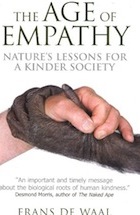Most popular accounts of evolution stress the innate selfishness of the process. Species change because individuals are driven by a blind urge to thrive at the expense of others, it is claimed. Frans de Waal begs to differ.
- The Age of Empathy: Nature's Lessons for a Kinder Society
- by Frans De Waal
-

- Buy it from the Guardian bookshop
The 61-year-old head of the primate behaviour department at Emory University, Atlanta, believes the success of Homo sapiens rests primarily with our capacity for empathy and our urge to understand and appreciate others. We possess an innate sensitivity to the emotional status of other members of our species. Indeed, this understanding is possessed by most mammals, particularly primates, but especially by humans. We have thrived on the milk of human kindness, says de Waal.
Most interpretations present evolution as a selfish process. Do you believe this blinds us to understanding the importance of cooperation?
Yes. We need to separate the process of evolution – which is, indeed, a self-serving process – and the actual motivations of animals. For example, sex evolved as a means to ensure reproduction, but not everyone thinks about reproduction when they are having sex. That is why we have the morning-after pill. So although a characteristic may have evolved for a selfish reason that does not mean it operates, psychologically, in a selfish way. That is why empathy evolved.
But what triggered its arrival?
There is an increasing consensus among biologists that empathy arrived with the evolution of maternal care in mammals. A female needs to be in touch with her offspring and understand when they are in danger or trouble. That probably explains why women tend to be more empathetic than men. There are also biochemical clues. The female mammalian hormone oxytocin seems to be a key controller. If you study cooperative and competitive behaviour among a group of men and women, and then you spray them with oxytocin, you get an increase in trust and empathy in those behaviours. That occurs because of this ancient link between maternal care and empathy.
The crucial point is that all mammals are capable of displaying some kind of empathy. At its basic level, an animal becomes sensitive to the emotions of others and often adopts some of those emotions. If one is happy and joyful, the others become happy and joyful. That is called emotional contagion and it has been studied in many animals, even mice.
However, more complex animals go beyond this. They try to understand the origins of another animal's emotional status – to try to appreciate why they are sad or happy. Mice don't do that but animals such as primates, dolphins and elephants do. In humans, this emotional perspective appears around the age of two and correlates to the appearance of self-awareness. That link is displayed across species. The more self-aware an animal is, the more empathetic it tends to be.
So how important has empathy been in the evolution of Homo sapiens?
It has been extremely important. It holds our societies together and drives us to care for the sick and the elderly for example. It also allows us to get along in cities. Chimpanzees – which can be very tolerant of others – would simply not put up with being surrounded by strangers of their own species and would start killing one another. Humans do not do this. They put up with masses of strangers around them. In that sense, we are very strange: we can tolerate others in huge numbers.
So is it harmful to focus on our alleged selfishness?
Yes. It is extremely dangerous. Many economists are great believers in the idea that everything in nature is competitive and that we should set up a society which is competitive to reflect that. Anyone who cannot keep up, well too bad.
I believe that is a total misinterpretation of the facts. The individual is not all-important. Yes, we can be selfish but we are also highly empathetic and supportive. These features define us and should be built into society.





